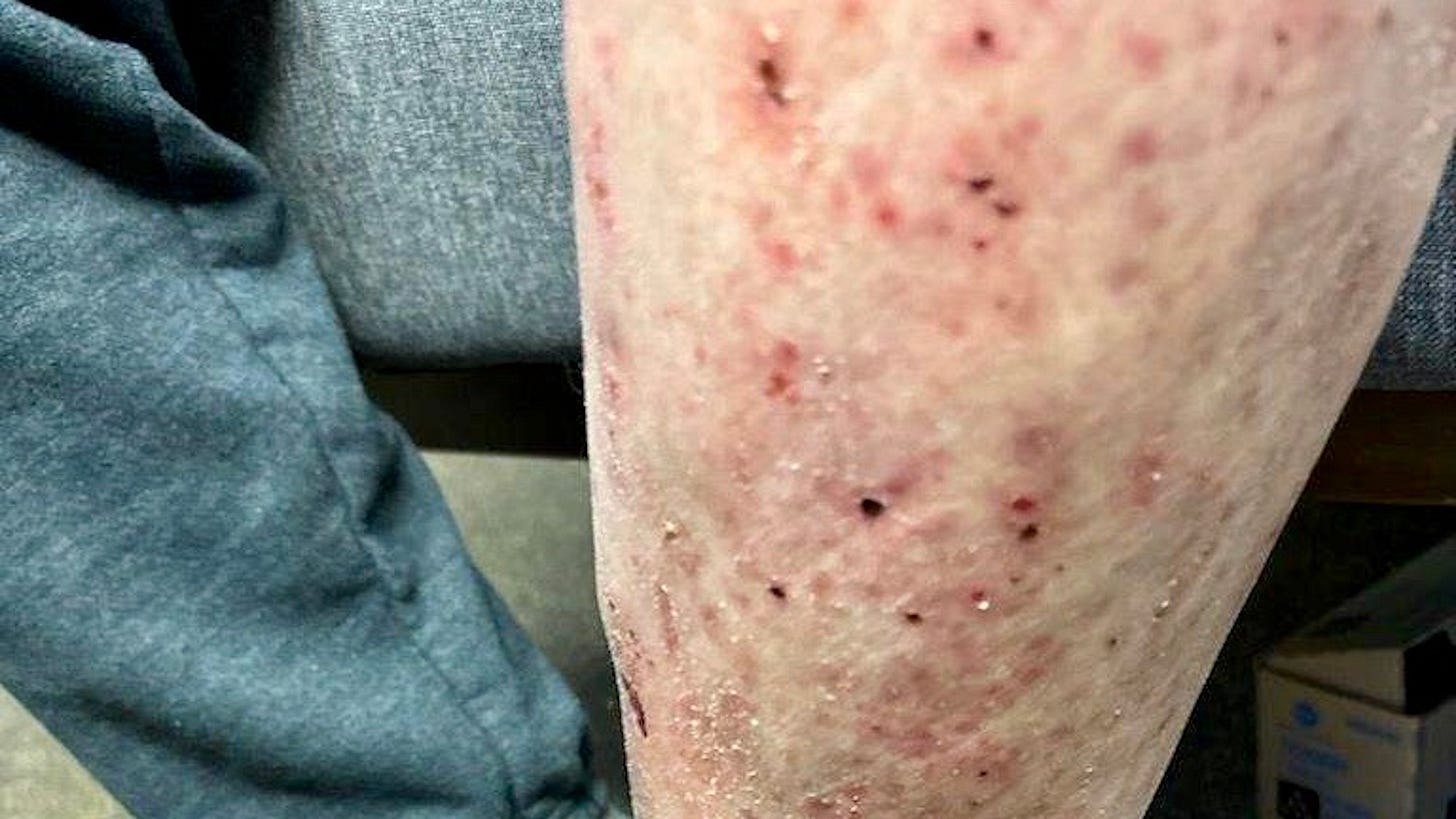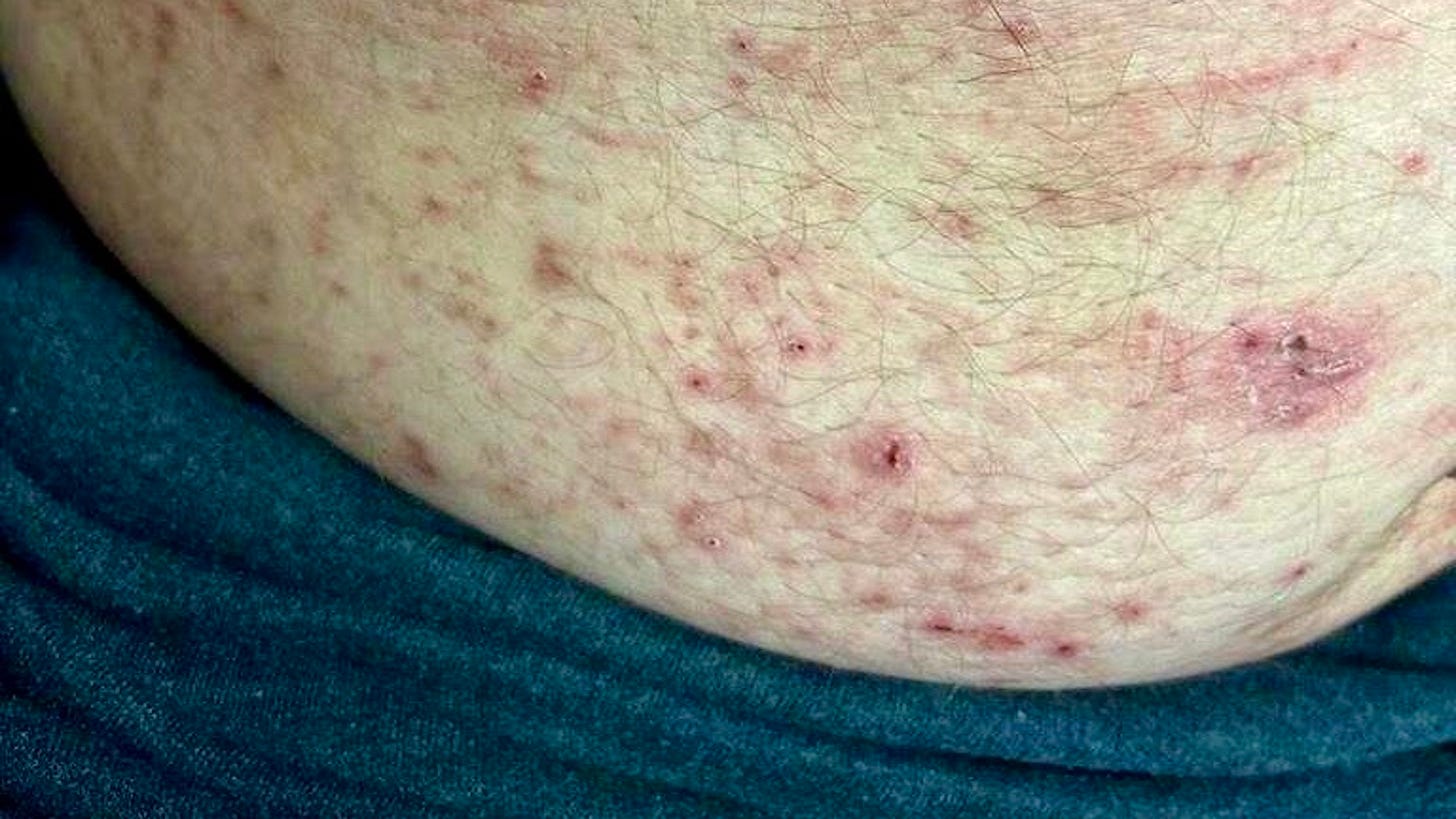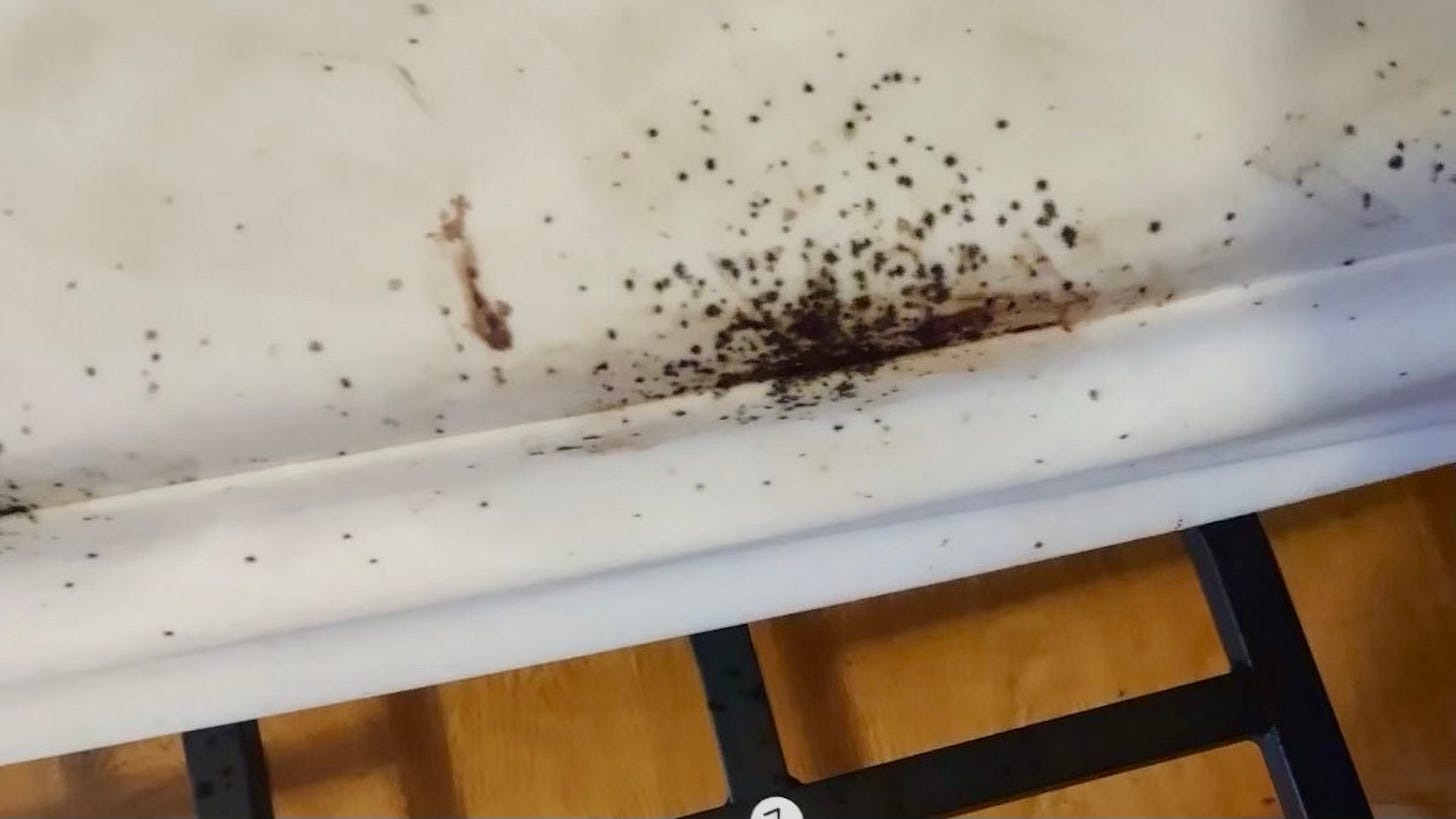"People in here are in agony." Bedbugs and scabies plague assisted living facility in Coventry
"...my first three days in here were Hell. I was covered - literally covered - in bedbug bites."
For the last five months, and on and off for years, Summer Villa Assisted Living in Coventry, Rhode Island has had a bedbug problem. The Rhode Island Department of Health (DOH) is aware of the problem, but regulations are such that there seems little that they can do. Some residents there are suffering, and some have been hospitalized. I spoke with a resident who wished to remain anonymous out of fear of retaliation. The following is an edited transcript:
Resident: This place is infested with bedbugs. I believe that the third floor is the worst. It's really bad. It was so bad that I went to the hospital and they quarantined me because they told me I had scabies. I caught that in here and I'm not the only one that has gotten scabies. They heat the rooms, but it doesn't work. They clean the rooms - nothing's working. And they keep telling us, “It's just a rash. It's not bed bugs.” It's getting crazy. Nothing's being done. People in here are in agony. They're just in agony because of these bedbugs.
Steve Ahlquist: In your estimation, does the place look clean?
Resident: No.
Steve Ahlquist: I saw some pictures of what looked like a bedbug infestation. Have you seen that yourself?
Resident: I have seen it. And other people in here have seen it as well. When furniture has been moved, there are thousands of them behind there. They're in the walls, they're in the floorboards, they're just everywhere and nothing's happening. Nothing's being done to get rid of them.
Steve Ahlquist: Have you tried to go outside of management to the Department of Health?
Resident: Yes, I did call the Department of Health and the Department of Health was here recently and I spoke with their inspector.
Steve Ahlquist: What did the inspector say?
Resident: She just took down what we were saying. She wrote down everything that we told her about the infestation.
Steve Ahlquist: How long do you think this has been happening there? How long have you been there and how long have you been suffering?
Resident: I've only been here for x months and my first three days in here were Hell. I was covered - literally covered - in bedbug bites. Covered. And I was only here for three days. But this has been going on for years. This has been going on for many years.
Steve Ahlquist: How many people are in this facility?
Resident: 62.
Steve Ahlquist: Are there other health issues that arise from living like this?
Resident: Oh my God, I was getting sick. I was constantly getting sick to the point where I was throwing up. My legs from the scabbie bites were so bad, they were literally swollen. And as I said, I'm not the only one.
Steve Ahlquist: But people are afraid to speak?
Resident: Yes.
Steve Ahlquist: Why are people so afraid? What would be the result of speaking out?
Resident: They don't want to get thrown out. They believe that if they open their mouth and say who they are, they're going to get thrown out.
Steve Ahlquist: Has the owner said anything like this to anyone?
Resident: No. I haven't heard anything. I don't really communicate with the owner. She's very difficult to talk to. The last time I talked to the owner was days ago. I told her about my situation in the hospital and all she did was blow me off. She was like, “Oh, I'm sorry you had to go to the hospital. Oh, that doesn't look like scabies. That looks like a rash, not bed bug bites.” But I know what it is. I know what the hospital told me I had.
I felt so dirty.
Steve Ahlquist: I'm so sorry for what you're going through.
I was alerted to the issue by someone who does not live there but has knowledge of the ongoing issues. They also wished to remain anonymous.
Steve Ahlquist: The stories from residents are horrible.
Source: Well, you haven't seen anything yet. Buckle up, Buttercup.
Steve Ahlquist: How long have you been aware of this going on there?
Source: It's been going on periodically for years, but this bout is at least a solid four or five months. Ironically, the Department of Health is there today.
Steve Ahlquist: Yes, I know. Are patients suffering health effects because of this?
Source: Well, mentally, of course. Being bit in your bed - there's no escape from it. Could they get infected? Certainly. But even without that, it leaves small scabs and the mental anguish of it is terrifying. They don't want to sleep, they want to get out of there. And then with scabies on top of that...
Steve Ahlquist: Can you, just for my knowledge, tell me the difference between scabies and bedbug bites?
Source: Bedbugs leave circular bites. Scabies tunnel under the skin.
Steve Ahlquist: So scabies are another infestation.
Source: Scabies are bugs that live on the skin. If you're not laundering properly, that's where the problem comes in. If everyone's laundry is being washed together in cold water, everybody gets them.
Steve Ahlquist: Resident told me that they're afraid to speak up because they're afraid they can be kicked out or abused.
Source: That is a fact.
Steve Ahlquist: What would it look like to be kicked out for raising your voice about something like bedbugs or scabies?
Source: Residents at facilities like this often say that they're mentally abused. What management may do is claim the person is behavioral or claim that they're violating the rules of the facility and then send in a 30-day notice and then either place them in another facility or not place them somewhere, essentially returning them to homelessness. It depends on the situation.
Do facilities usually do that? No, because a head in a bed is money, but a 30-day notice is a threat that's constantly held over their heads.
Mind you, most of the residents started out experiencing homelessness. The threat to them is homelessness because they don't understand the process.
The rooms are paid for by Medicaid and Social Security. Residents have to surrender their Social Security checks and they get a monthly stipend of $120.
Steve Ahlquist: And that's all the money they can use for themselves.
Source: For personal needs. Yes. They cannot afford to live elsewhere. That's the problem. It's not like they can just say, "Screw this, I'm getting an apartment." They have no means. And 90% of them have a diagnosis of mental illness of some sort, sometimes coupled with medical illness.
Steve Ahlquist: Is it possible that the diagnosis of mental illness is being used to dismiss some of the claims they are making?
Source: Yes. Absolutely. 100%. “They're crazy, so they're making it up. They're lying. That's not true.” And people buy it.
Steve Ahlquist: A resident told me that she's been at Summer Villa for X amount of months and that she was miserable in the first three days because of the bedbugs.
Source: They don't make people aware that there are bedbugs in the facility before they move them in.
Steve Ahlquist: I speak with a lot of people who live outside in tents and they tell me they avoid going into shelters because they're afraid of things like bedbugs and having all their stuff contaminated.
Source: Can you imagine handing over your social security check to live that way? Regulatory-wise, all the facility has to do is have an exterminator in place. No one ever follows up to determine if that exterminator is effective.
Steve Ahlquist: How can you be in regulation and have people sleeping in beds that are riddled with bedbugs? I don't understand how that's possible.
Source: Department of Health, my friend.
Steve Ahlquist: All you need is a contract? That cannot be the end-all-be-all of this. That's just insane.
Source: They say, “They're within regulation.” We say, “But the residents are being harmed.” And they say, “But they're within regulation.” We're going back and forth all day.
Ahead of a phone call from the Department of Health's Public Information Officer Joseph Wendelken, he sent me the following email:
“Summer Villa has been trying to manage the issue of bed bugs for some time. All facilities are required to have a pest control plan. Summer Villa has one of the most aggressive pest control plans of any facility in Rhode Island. They have implemented every pest control approach that exists. They have a canine that comes in regularly to smell furniture for bed bugs. They do regular heating treatments, and they have a pest control firm come in regularly for treatments. We have had inspectors at the facility many times to consult with management on these different approaches. Bed bug eradication is still extremely difficult.”
Steve Ahlquist: Is the Department of Health aware of a bedbug problem at Summer Villa Assisted Living in Coventry?
Joseph Wendelken: It's absolutely something that we're aware of. We've had inspectors out, I can say more than a dozen times.
Steve Ahlquist: You had somebody out there today.
Joseph Wendelken: Yes, that's true. We had someone today for a full survey, a scheduled routine survey. But given what we know and given some of the complaints we've received, we also have our inspectors looking into this specific bedbug situation.
Steve Ahlquist: I have to ask: If you went to a hotel and they had bedbugs like that and they said, “We're working hard to eradicate them” would you stay there?
Joseph Wendelken: Would I stay at that hotel?
Steve Ahlquist: Yes. “They're hard to eradicate and we're working real hard to get rid of them, so let us take your money and you can stay here.” Would that be adequate?
Joseph Wendelken: I mean, if you're asking me personally, no, I would not.
Steve Ahlquist: Do you think anybody who works at DOH or in state government would feel differently??
Joseph Wendelken: I understand where you're coming from. It's a major issue and it's a unique situation there. This is not like a nursing home or other assisted living facilities in the state. This is a very mobile population.
Steve Ahlquist: I know who we're talking about. We're talking about recently unhoused people, 90% of whom have mental health issues.
Joseph Wendelken: I'm not talking about just health situations. In terms of a younger resident population, we sometimes see bedbugs in congregate living settings like nursing homes and assisted living facilities. This has been an issue there. A contributing factor is that this is a much more mobile population. People are in and out a lot. The eradication efforts that might happen, say in a hotel to use your example, are much less complicated because guests come and they leave. But here you have people coming in and out again. It's a much trickier situation to manage.
Steve Ahlquist: I'm not satisfied by that answer, as you might imagine. We're talking about a population that to move in there has to sign over their social security checks. The facility takes that money and in return, the residents get bedbugs and scabies. Residents have also told me that if they were to report this and go on the record, they may be kicked out.
Joseph Wendelken: Our complaint and investigation system is entirely anonymous. If anyone files a complaint about any healthcare facility or residential facility with DOH, that's always a hundred percent confidential.
Steve Ahlquist: I will let people know that. But at the same time, you recognize that the population we're talking about here might have a real fear of becoming unhoused, right?
Joseph Wendelken: I understand.
Steve Ahlquist: We're talking about people who are routinely marginalized in society. This has been happening there for years, on and off, and for five months at least as of this current outbreak.
They don't need a bed bug-sniffing dog. DOH and the Attorney General need to get involved and do something real about this, not just file reports and tell me everything's going okay.
Joseph Wendelken: I'm not telling you everything's going okay. What I'm telling you is that they are taking steps to try to address the problem. Has the problem been completely addressed? Absolutely not. I don't need to see the videos and the pictures. I know for a fact, based on everything I'm being told internally by our inspector. I'm not trying to minimize it in any way. I'm just being honest with you about the steps that we know have been taken to date. Does more need to be done? Absolutely. It's also just a very complex problem.
Steve Ahlquist: What would those new steps include? Could criminal charges be brought for negligence and abuse?
Joseph Wendelken: The Department of Health doesn't file criminal charges, but what we could do is identify deficiencies based on their standing as a Centers for Medicare and Medicaid Services participant getting CMS funding.
Having bed bugs in and of itself is not considered a deficiency. Not having an eradication plan and not doing everything you can to address bedbugs would be problematic. We have inspectors out there quite often.
Steve Ahlquist: And facilities are allowed to be deficient for five months to a year?
Joseph Wendelken: Deficiency is something that's identified when a specific survey is happening.
Steve Ahlquist: How long is a deficiency allowed, even if they have a plan? Because if the plan's not adequate, then it's still a deficiency months and months later. At what point does it become more serious? Can it become more serious?
Joseph Wendelken: A deficiency is in place until a facility submits a plan of correction, which outlines what they're going to do and when they're going to do it. That all gets submitted to CMS.
Steve Ahlquist: It seems to me that if this were anybody else, they would be suing this organization and get them in line. But because it's people who are formerly homeless, and possibly diagnosed with mental illness, it's not going to happen. There are no teeth to these regulations. I know you can't speak to that, but I need to say it out loud.
I would urge you to take this seriously. Maybe this is all you can do, but I'm not seeing anything from the management that tells me they take this the least bit seriously. I would wish that DOH would have the ability to do more.
Joseph Wendelken: We can hold them accountable for things, like having a pest control firm, doing the heat treatments, having a canine in there searching for bed bugs, and taking steps to eliminate what they find. It's a very complicated situation for management. And again, I'm not trying to minimize or give anyone a pass, but I'm just being honest about what we are seeing.
Steve Ahlquist: DOH has limits to what they can do. You can't do more.
Joseph Wendelken: Our role is to ensure that they're taking steps to try to address the problem.
Steve Ahlquist: And if those steps are inadequate, that's okay.
Joseph Wendelken: I wouldn't necessarily say that. The problem is not fixed, but they have taken a very aggressive approach to try to address the problem.
I called the facility’s management for a comment. Steve Jackson called me back.
Steve Jackson: Can I help you?
Steve Ahlquist: My name is Steve Ahlquist. I'm a reporter. I've had conversations with some people and with the Department of Health about a bedbug infestation at your facility.
Steve Jackson: First of all, the Department of Health did not disclose anything like that, so that's a lie.
Steve Ahlquist: I talked to Joseph Wendelken. I'm just telling you what I know.
Steve Jackson: Unless an entity shows up here and does a thorough inspection on their own, they have no idea if there are any infestations at all. And I can tell you we do not have a bed bug infestation or problem.
Steve Ahlquist: Do you have a contract … ?
Steve Jackson: I'm going to ask that you please no longer call this company for any reason. We only have to report to the Department of Health and they are not going to report to a pro bono reporter about something.
Steve Ahlquist: I'm not a pro bono reporter.
Steve Jackson: Please, you are not allowed to contact us. Again, my name is Steve Jackson. My wife is the owner of Summer Villa. Have a good day.









Residents have the right to “live in a safe and clean environment.” That right is clearly being violated for these residents, and enforcement of that regulation is RIDOH’s responsibility. http://webserver.rilin.state.ri.us/Statutes/TITLE23/23-17.4/23-17.4-16.HTM
This is horrible!! I am totally shocked that this can be allowed to go on. People are paying money to be abused like this? I now have absolutely no respect for our Dept of Health. I don't even know what else to say!